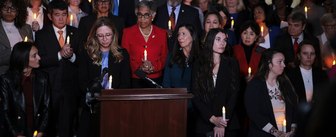Concern about the teaching of critical race theory in schools may have helped Republican Glenn Youngkin win Virginia’s gubernatorial election this month, as many commentators suggest. If so, then what was decisive wasn’t how many Americans thought the concept was being taught in their local schools, but how strongly those who thought so felt about critical race theory, as they understood it.
Many haven’t even heard much about critical race theory, or CRT as it’s often abbreviated – or if they have they aren’t sure what it means. Just four in ten in the latest Economist/YouGov Poll say both that they are aware of CRT and that they can define it. About half of Republicans say both. What CRT really is, and how it’s been understood in recent political discussion, are a matter of some debate.
Four in five Americans – including three of four who are parents of children under 18 – either don’t think critical race theory is being taught in local schools or aren’t sure. However, Republicans are three times more likely than Democrats (31% to 10%) to say CRT is being taught in their community’s schools. And Americans who think CRT is being taught in their community’s schools are overwhelmingly negative about CRT, as they understand it.
Belief that critical race theory is being taught in schools comes along with negative attitudes about the state of the country — though not about the pervasiveness of racism. Four in five Americans who think CRT is being taught in their local schools say the country is on the wrong track, compared to less than half of people who don’t think CRT is being taught locally. Only 24% approve of how President Joe Biden is handling his job — compared to 60% of people who don’t think CRT is being taught locally. And 59% describe the economy as poor, compared to 27% for people who don’t think CRT is being taught locally. However, Americans who think CRT is being taught in their local schools are more likely than those who don’t think so to say that racism is not a problem in society (24% to 9%), and that racism is only a problem with individuals who are racist (52% to 22%) rather than a broader problem.
Americans who think critical race theory is being taught in their local schools also are far less likely to say that powerful American institutions ever operate in racist ways. More than half say so about television news and about the president.
The Supreme Court and the president are less often seen as operating in racist ways than the other institutions polled. Television news, the criminal justice system, and the police are the most likely to be thought of as operating in racist ways. But views by party and race differ — particularly when it comes to assessing banks and other financial institutions.
Not only do most Americans not say critical race theory is being taught in their local schools, but they’re more likely to say other race-related topics are being taught: the history of slavery, the Civil War and Emancipation, and the civil rights movement. Black Americans are less likely to say these subjects are being taught than white Americans.
Americans who believe critical race theory is being taught in their local schools are more likely to believe the history of slavery and the civil rights movement also are being taught in their local schools.
See the toplines and crosstabs from this Economist/YouGov Poll
Methodology: The Economist survey was conducted by YouGov using a nationally representative sample of 1,500 U.S. adult citizens interviewed online between November 6 and November 9, 2021. This sample was weighted according to gender, age, race, and education based on the 2018 American Community Survey, conducted by the U.S. Census Bureau, as well as 2016 and 2020 Presidential votes (or non-votes). Respondents were selected from YouGov’s opt-in panel to be representative of all U.S. citizens. The margin of error is approximately 3% for the overall sample.
Image: Getty










